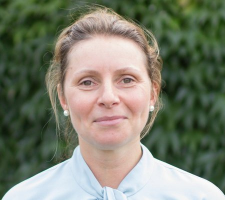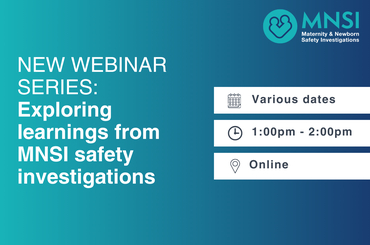
With MNSI’s transition to CQC completed and a new year underway, it’s a good time to look towards the year ahead and a new chapter in MNSI’s history. Sandy Lewis, Director of the Maternity Investigation Programme, sat down with MNSI’s editorial team to reflect on past accomplishments, ambitions for 2024, and how the CQC transition is bedding in.
Q1. Let’s start with the fundamentals. What are MNSI's vision and values? How do these principles guide the work of your team?
Sandy Lewis (SL): Last year, we published our new vision statement of “advancing maternity safety: fostering trust, leading investigative excellence, reducing harm”. From that we have developed a set of values that will guide our strategic direction of travel in 2024 and beyond. These values are:
- Excellence: We are effective in maintaining the highest level of excellence.
- Collaboration: We are supportive of others and value working together to achieve our goals.
- Learning: We will grow and learn as individuals and as an organisation.
- Integrity: We act with sincerity, openness, honesty and respect.
The values have two-fold importance. Firstly, internally, they guide how we work together as a team and ensure we remain focused on delivering on our responsibilities. And secondly, the values provide accountability in our work with families and across other organisations. We need to demonstrate our values are important in everything we do.

Q2. With MNSI now hosted by CQC, could you explain the significance of this new home and how it enhances the impact of your programme?
SL: We’re still in the early stages of understanding the possibilities that the transition affords us but one thing I want to make clear is that MNSI’s role and purpose has not changed. We continue to investigate cases that meet our criteria and work to share the learnings for the benefits of families, trusts and national bodies to improve maternity care.
Our new arrangement with CQC ensures the continuation of the maternity programme and maintains the independence of maternity investigations within the NHS. This new chapter presents the opportunity for further collaboration within the health and social care sector. This year, we will be able to access more resources as part of a larger organisation, including improved analytics capacity and the opportunity to contribute best practice learning through national reporting.
Q3. Looking back at the achievements of MNSI in the past year, what are some key milestones or successes that you are particularly proud of?
SL: I’m amazingly proud that, despite all the changes that have happened within the organisation, the team has not lost sight of the importance of delivering on our core function while sticking to our values and maintaining our reputation with families and trusts. All last year, the team strived to deliver thought-provoking pieces of work to inform safer care within the maternity and wider healthcare settings at conferences and on our blog.
Q4. In light of the new year, can you outline the ambitions and goals that MNSI has set for 2024? How do these align with the broader objectives of ensuring maternity and newborn safety?
SL: Our strategic direction is being finalised ahead of April, but currently we are working to enhance and evolve our existing work, including looking at equality, diversity and inclusion and how we can develop and enhance what we’re already doing. We’re going to be looking more at learning through excellence and thinking about other areas we can add value.
Q5. MNSI plays a crucial role in investigating safety issues. How does the programme collaborate with healthcare providers, professionals, and organisations to improve safety standards in maternity and newborn care?
SL: Stakeholder engagement will be an area of considerable development over the next year and one that we approach with a greater degree of strategic orientation. Whilst we’re already working very closely with some of our key partners, there are lots of other organisations, including charities, advocacy groups and research organisations, that we’re keen to engage with. All of whom have thoughts and considerations in relation to safety issues we’re looking at and are fundamental to joining the puzzle together.
So, I think we do have a crucial role to play, we hold a wealth of information and opportunities for learning, which other members in the system don't always have sight of. Our role is to ensure that we make sure they are sighted on that and to provide an opinion and perspective that demonstrates our involvement within patient safety in the system.
Q6. As part of the leadership team at MNSI, how do you foster a culture of excellence within your team? What measures are in place to ensure that lessons learned from investigations are implemented effectively?
Fostering a culture of excellence is not static and we have a responsibility to continually look internally and externally in relation to our own and others’ culture and behaviour. Excellence is about how we support and enable the development of our team, who are very experienced and have a broad range of skillsets. The process of investigation can be complex and at each stage we need to be achieving the highest quality of work to support an end product that positively influences and impacts on improving safety.
Externally there is recognition of the extent of investigatory skills and experience our team has. Increasingly, we’re seeing different team members present core pieces of work that they have brought forwards to be shared across the system.
Pursuing excellence is inherent to MNSI and we are continuing to develop quality assurance processes that reflect feedback from within our team, from families, and from staff who form part of our investigations.
Q7. Looking ahead, what do you believe are the most significant challenges and opportunities in the field of maternity and newborn safety, and how is MNSI positioned to address them in 2024?
SL: We are entering a period of political turbulence so more than ever it is time to make sure that maternity safety and consistency in sharing learning are a top priority and remain so whatever the outcome of the 2024 general election.
Q8. How does MNSI ensure that its work is transparent and accessible to the public? What efforts are in place to communicate key findings and recommendations to a broader audience?
SL: Our job is to investigate the small percentage of cases that result in an exceptional adverse outcome and minimise those cases through sharing learning. It’s also important to make sure that, in being transparent with those findings, we’re not skewing the narrative so far that people lose sight of the fantastic work being done by clinical staff all over the country and lose confidence in the system.
Our new website is now live and its continuing development is an opportunity to enhance our communications and transparency where there are thematic learnings. Our individual investigation reports aren’t shared in the public domain so there’s a balance to be struck between transparency and confidentiality.
Q9. In conclusion, what message would you like to convey to healthcare professionals, policymakers, and the public about MNSI's commitment to ensuring the safety of mothers and newborns in the coming year and beyond?
SL: Safe care is the responsibility of all organisations involved in this arena and we have a responsibility to support those who provide care and those who receive care. We're privileged to support and be trusted by families and staff during sensitive times. Hearing their stories means we have unique insight into the maternity care system. It’s our role and duty to make sure that that insight is used to drive change and support improvement across the system.
Stay up to date with all the latest news from MNSI:
Related news
MNSI responds to the publication of the NHS 10 Year Plan
MNSI responds to maternity and newborn safety announcement 23 June 2025
